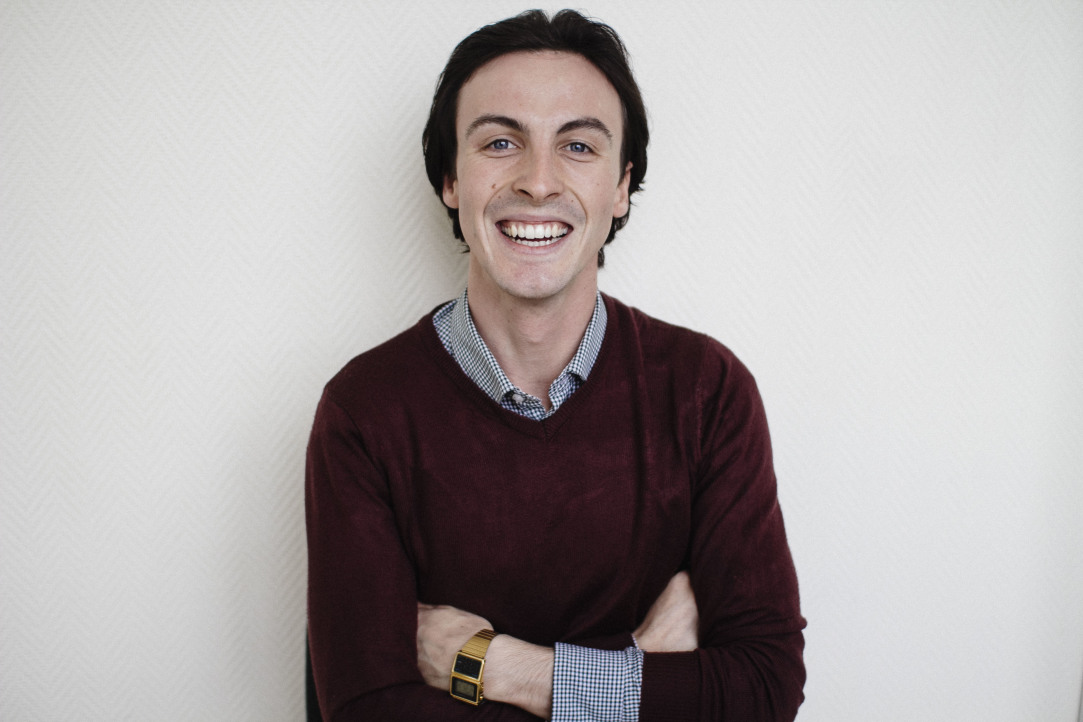Intense Curriculum with Many Benefits: HSE University Degree Takes Alum from Moscow and Rotterdam to Brussels

Strategic Corporate Finance Master’s Programme alumnus Edoardo Alberti (’18) currently works in Brussels, a major energy company. He spoke with HSE News Service about how his studies at HSE University prepared him for a career right after graduation.
When he first began his studies in strategic corporate finance at HSE, Edoardo Alberti recalls that it was intense. However, he soon got into the swing of things. He managed to get a part-time internship with a company in Moscow, and then he completed his second year pursuing a double degree at Erasmus University Rotterdam. After that, he started his career in the energy sector in Brussels, where he has been working for almost three years.
Getting Interested in Economics and Russia
I graduated from high school in Italy and didn’t know what I wanted to study at first. I chose economics because I found it among one of the most practical sciences. I was always fascinated by how people make financial decisions under certain or uncertain conditions, how a company generates money and wealth for its stakeholders, and more. So, I started my academic path at University of Nice Sophia Antipolis in the south of France.
There I had an opportunity to choose a foreign language to study, and France has a lot of Russian influence. There are a lot of Russian people around (when I would wait for the bus, I always heard people speaking Russian). I decided that it might be useful to study Russian and that is what I did. When you study Russian language or any language, the whole cultural dimension comes with it. And I said to myself: well, where would be the best place to learn Russian? Of course, France was a good start but then my plan was to go to Russia.
At that time, my dream was to become an export manager for a company that does imports with Russia, which ultimately is not too far from what I do now. I interact quite a lot with Russia as part of my day-to-day job.

Choosing HSE
As a bachelor’s student I did a couple of exchange programmes, the first of which was in Poland. Then in my third year I discovered that my university signed a contract with HSE University. I didn’t know much about HSE, so I had to research it and see what it was about. It seemed like a great opportunity to continue studying Russian while learning about economics and finance. So, I moved to Moscow for my exchange programme at HSE University.
When you are an exchange student you can choose courses from any faculty. Most of the courses I chose were in the Faculty of Economic Sciences but I also chose some in data science and sociology. So, I have studied in a variety of faculties here, but of course, my focus was mostly on finance.
My exchange programme was fun. I loved how big and exciting Moscow was.
I started thinking about whether I should go back to Europe or stay in Moscow for a master’s programme. After a while, I finally decided to continue in Moscow — if you look at the opportunity that HSE University offers, it seemed like a clear choice. You can study in Moscow and then also get a double degree from a European university, so I decided: why not choose both?
Getting in and the First Semester
I requested a recommendation letter from a professor at HSE University and a professor from my university in France. One thing to keep in mind is that getting into the programme does not necessarily it’s a done deal. The first semester is quite tough, and I remember a couple of students had to change master’s programmes and move to something a little bit less quantitative. So, admission is not the most complicated thing. It is more about the survival of the first semester.
The first semester is a tough one, probably the toughest. They want to make sure that you know the kind of good standard of studies. You have to do a lot of projects and multitask.
There are a couple of courses that are particularly demanding such as microeconomics. I have to say, though, despite the fact that it was one of the most challenging courses, it was one of the best. It really helped me a lot in my work. The second semester is a little bit demanding as well but there is more time to do your own project, decide what you are going to do for your master’s thesis, if you want to find a part-time job, or you want to do extra courses online, or do something for yourself.
If you decide to go for it, HSE University recommends a few Coursera courses that help you get up to speed with math analysis, programming, and more. I think a good grasp of math is very good to have to start the first semester which was a bit challenging for some of us.

Intense Curriculum
The Strategic Corporate Finance Programme has quite an intense curriculum. I liked it is because I found it to be very balanced in the sense that it combined quite a lot of disciplines, so you start on the first semester with the economic theory so my microeconomics and macroeconomics which was nevertheless very useful courses.
The microeconomics course was quite demanding, but I found it especially useful, because my trading job now it is all about microeconomics, so it is important to know how the microstructure of the market works.
Of course, there are also a lot of in-depth courses on corporate finance and valuation for people who want to get into investment banking, project evaluation, or acquisitions and mergers. There is a lot of focus on the differences between developed and developing countries, and evaluation is more of an art rather than science—there are a lot of exceptions on top of the common rules. I found that the programme was very well-structured in addressing some of the shortcomings of valuation models.
I saw recently that other courses have been added. There is a quantitative finance course that will cover more the stochastic calculus and the derivative side, which is great knowledge to have on top of corporate finance, investment, and quantitative finance. There’s also a course on theory of finance, which looks at the fundamental laws of asset pricing. So, if you don't want to go into investment banking but rather work in a hedge funds, pension funds, or mutual funds, the Strategic Corporate Finance Programme offers you very useful courses.
Lastly, I’d like to mention that there is also a lot of focus on data science, machine learning, and econometrics, which is becoming more and more important. In my first year, I took an entire yearlong course on econometrics, and as part of the electives that I could choose, I took a Python course. That is a very important skill; a lot of companies value coding and computer science skills.
Hard Skills-Soft Skills Balance
In addition to giving you the hard skills you need in mathematics, econometrics, and programming, the Strategic Corporate Finance Programme gives you soft skills. When you go to a company, it is a very social environment, and I think a lot of the people who are able to move up in their careers quickly are people who can present themselves well and explain complicated ideas. The way the Strategic Corporate Finance Programme is designed gives you a lot of experience with analysis but at the same time you are also evaluated based on your presentation skills.
A particular feature of the programme curriculum that gives you soft skills is the strong emphasis on group project work.
I learned that it’s very important to choose a good team. In the first semester you get an understanding who the top-performing students are and the kind of people you want to form a group with. This is an important skill everywhere in life — every university and every company.

Cost and Benefits
I think one of the benefits of the Strategic Corporate Finance Programme at HSE University is that it is not as expensive as other master programmes that you might find in Europe, not even to speak of the USA.
HSE University offered me full tuition coverage and I had the opportunity to work part-time as well, so I did not have to spend time doing an internship after graduation. I was able to step right away into a job.
In other universities in Europe, there is much more competition across students. I think at HSE University there was a healthy balance with student cooperation, and you learn how to work together to compete with other teams. Not every university has the kind of atmosphere in which you can cooperate with students and help each other out.
Basic Knowledge of Russian
If you have some basic knowledge of Russian and if you speak it a bit, it is helpful. I think it helped me manage to find a part-time job my second semester. I researched Italian companies based in Moscow and got in touch with all of them. One of the jobs that I found was for an Italian utility company. I remember that when I sent my CV, nobody really considered me. Then I decided to call the company and just say ‘Hi, I sent you my application. Did you receive it?’ Interestingly enough they then got back to me and invited me for an interview. That’s how I got the part-time job. Working part-time is not a mandatory thing — a lot of people that I knew had their own projects, or their own small business, or some people decide to focus only on their studies and think about a job later. So, it is up to you.

Double Degree in Rotterdam
After I completed my first year at HSE University, I did all of my second year at Erasmus University. I had become passionate about the commodity and energy markets, especially since Russia has a lot of interaction with the energy world both economically and politically. My goal was to learn a bit more about how trade and commodities flow from Russia into Europe, and I thought that going to Rotterdam would be a great opportunity to further develop my knowledge on that side. Therefore, as part of the HSE University programme, I did a double degree with Erasmus University.
I think another pro of the programme is that you can do a study abroad or a double degree. I think it is a nice opportunity and not every university offers that.
When it came to the thesis defense, I did the same thesis for both universities so, I first defended it at HSE. I came back to write my master’s thesis at the end of the second year, and my defense was held online. (This, by the way, was before the pandemic. Doing an online defense was no problem). In the Netherlands, you can choose your time slot to defend your master thesis, and it does not have to necessarily be a fixed time. You can do it a few months after the end of school. Therefore, I did the online defense for HSE and then an in-person defense at Erasmus a little bit later. I had two supervisors — one in Moscow and one in Rotterdam. It was quite useful because I had two sources of academic support helping me improve my research.
In terms of the thesis itself, I did more or less the same text for both. Maybe some professors had slightly different requirements than others so there were some slight deviations here and there, but the backbone was the same.
I earned two degrees — one from HSE University and then one from Erasmus. What HSE University offers you is the opportunity to study one year, to do one year of your master’s abroad, and then it counts towards your credit accumulated there locally so that is how it works. You can also go for an exchange, but I went for a formal double degree.
Landing a Job
It may sound trivial, but I found the job fair company events in HSE University extremely useful. There are also a lot of companies interacting with the University, so we had a lot of opportunities to network with consulting firms, though it is not always easy to make yourself take advantage of all these opportunities.
Never turn down any networking opportunity, because you never know how you might find your next job.
Never refuse an interview, even if it’s for a position or with a company you're not particularly interested in. I did an interview for a position that I didn't particularly like but then I pushed for getting a different position in the company, and it turned out to be feasible.
HSE University welcomes applicants from all over the world and offers not only different levels of study, but also different formats in English and Russian, online and offline. International applicants can apply for Bachelor’s and Master’s degree programmes in a separate admissions process for foreign applicants and receive scholarships with full or partial tuition fee coverage.
When applying to a Bachelor’s programme, including five English-taught programmes in Moscow, it is possible to submit international certificates you have received in English and mathematics, such as TOEFL, A-Level and other international exams and they will be recognized by HSE University, so taking entrance exams in relevant subjects will not be required.
Undergraduate applicants can test their chances of admission now by taking mock tests. Master’s applicants also have the opportunity to get a preliminary assessment of their portfolio and communicate with their programme of choice online.
To learn more about HSE University, its admission process, or life in Moscow, please visit International Admissions website, or contact the Education & Training Advisory Centre. The staff are happy to advise applicants and their parents via e-mail at inter@hse.ru, by phone +7 (495) 531 00 59, or WhatsApp +7 (916) 311 85 21, as well as on social media in Russian and in English: Vkontakte,Telegram.
See also:
‘This Programme Helps Me Understand Global Dynamics’
Mahmoud Tarayra, from Jordan, is studying on the HSE University and Kyung Hee University Double Degree Programme in Economics and Politics in Asia. In his interview with the HSE News Service, he talks about his studies in Moscow, the difficulties of adjusting in Korea, and how to enjoy both summer and winter in Russia.
‘HSE Offers a Wealth of Opportunities, but It’s up to You to Take Advantage of Them’
Zhou Jinyu is a third-year student of the Bachelor’s programme ‘Data Science and Business Analytics’ at the Faculty of Computer Science at HSE University. She talked to the HSE News Service about studying on the double-degree programme, her career prospects, her attitude to artificial intelligence, and why it’s important to step out of your comfort zone.
‘Asia Is Fascinating, Rich in Culture, and Expanding in Economic and Political Significance’
Anastasia Baschlykoff is a German citizen who recently enrolled at HSE University to pursue her love of Korean studies. As a student of the Double Degree Programme in Economics and Politics in Asia, she is gaining insight into Asian politics, culture, history, and language, and will spend the third year of the programme on an exchange at Kyung Hee University. In her interview with the HSE News Service, Anastasia explains how the programme aligns with her career plans, considers the potential for collaboration with Asian countries, and shares how life in Russia has managed to surprise her.
‘This New Specialisation Will Be a Real Challenge for the Most Ambitious and Motivated Students’
The HSE University and Kyung Hee University Double Degree Programme in Economics and Politics in Asia is launching a new specialisation in ‘Quantitative Economics and Finance in Asia.’ Students will gain fundamental knowledge regarding the mechanisms, driving forces, and features of economic and financial processes in Asia through the prism of quantitative analysis methods. Ivan Deseatnicov, Supervisor of the new specialisation, Associate Professor at HSE Faculty of World Economy and International Affairs, speaks about the features of the new track.
How to Make the Most of a Double-Degree Programme
Ekaterina Zhizhina, student of the Master's programme 'Business and Politics in Modern Asia', shared her impressions of Ca' Foscari University (Italy) and the specifics of studying on a double-degree programme.
'Studying and Living in Russia is so Enriching, Fun and Interesting'
Under an agreement between HSE University-St Petersburg and the University of Trento (UniTrento), students of the Master’s programme 'Modern Social Analysis' can participate in a double degree track. Cecilia Brazioli, from Italy, is a participant of the track who shared her impressions of studying in Russia.
Gain Knowledge and Make Friends from All Over the World with a Master’s in Economics, Politics, and Business in Asia
As political and economic centres shift towards Asia, demand for specialists in the economic, political, and business environment in Asian countries will only increase. The Double Degree Programme in Economics, Politics, and Business in Asia offered by HSE University and Kyung Hee University (Seoul, South Korea) trains graduates with sought-after competencies for careers in international business, banking, government, media, academia, tourism and hospitality, entrepreneurship, and more.
'Studying at LUISS Is a Good Test to See How Committed You Are'
Andrei Lukyanov enrolled in ICEF Master of Financial Economics programme in 2019. In his second year, Andrei went to LUISS University in Rome as a double degree student. Currently a financial analyst at TAU Group, the Italian-Russian engineering startup, Andrei speaks on how to prepare for the career as a quant, the opportunities that come with studying abroad, and what duties the financial experts have in e-mobility.
Vaccines as a Profession: ICEF Graduate Talks about His Work at Sanofi Pasteur
Nikolay Kuzin, a 2011 graduate of ICEF, is brand manager at Sanofi Pasteur (France), a company that has been manufacturing vaccines for many years and where he oversees the launch of new products in Eastern European markets. We spoke with Nikolay about how he combines the background in finance with the administrative responsibilities in his position, about the unique nature of French master’s programmes, about how long it really takes to develop a vaccine, and about why Europeans trust medical developments in their countries.
‘Everyone Is Excited about Innovation and Digital Transformation’
Monica Spychala (USA) is a double-degree Master's student at Technische Universität Berlin and HSE University’s Institute for Statistical Studies and Economics of Knowledge (ISSEK), where she studies Governance of Science, Technology and Innovation. Monica spoke with HSE News Service about why she chose HSE, what it is like to study remotely in the Governance of STI programme, and how she is already putting her knowledge into practice.


